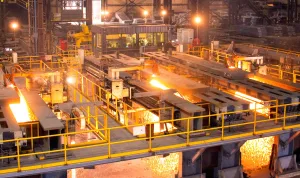How Steel Production Boosts Economic Growth: Key Drivers and Impacts

Steel production has long been a cornerstone of industrial economies, acting as a driver for growth, infrastructure development, and technological progress. The importance of steel production for boosting the economy extends far beyond just manufacturing. It touches on several key sectors, from construction and automotive to energy and transportation, making it an essential component of any growing economy.
1. Foundation for Infrastructure Development
One of the primary ways steel production supports economic growth is through its critical role in infrastructure development. Steel is the backbone of buildings, bridges, railways, and power plants. Countries undergoing rapid development, such as China and India, have relied heavily on steel to fuel their infrastructure projects.
- Construction Boom: Steel is widely used in both residential and commercial construction. The demand for steel rises when governments invest in new roads, bridges, and public buildings, directly boosting steel production and employment in the sector.
- Urbanization: As cities grow and urbanization accelerates, the demand for steel in high-rise buildings, public transport systems, and utility infrastructure increases, contributing to economic expansion.
2. Industrial Development and Export Opportunities
Steel production is vital to a wide range of industries, including automotive, machinery, and shipbuilding, which rely on high-quality steel to manufacture durable and safe products.
- Automotive Sector: Steel is a key material in vehicle production, offering strength and flexibility. A strong domestic steel industry enables countries to support their automotive sectors, creating jobs and boosting exports.
- Global Trade: Steel production also has a significant impact on international trade. Countries that produce surplus steel can export it to global markets, enhancing their trade balance and creating additional revenue streams. Nations like China, South Korea, and Japan are major players in global steel exports, which helps them maintain strong economies.
3. Job Creation and Employment
Steel production is labor-intensive, and as a result, it provides significant employment opportunities, both directly and indirectly. From steel mills to mining for raw materials, the steel industry supports millions of jobs worldwide.
- Direct Employment: Steel production plants require skilled labor, creating jobs in areas such as engineering, logistics, and manufacturing.
- Supply Chain Impact: Beyond direct jobs, steel production stimulates employment across its supply chain, from mining to transportation and distribution of steel products.
4. Technological Advancements and Innovation
Steel production drives technological innovations, especially in areas like automation and energy efficiency. The industry’s push for more sustainable and efficient production processes has led to advancements that benefit other sectors.
- Energy Efficiency: New technologies in steel production, such as electric arc furnaces and renewable energy integration, contribute to reducing energy consumption, lowering production costs, and minimizing environmental impact.
- Recycling Initiatives: The use of recycled steel has become more prevalent, creating a circular economy that reduces waste and promotes sustainability, further boosting the economy by reducing reliance on raw materials.
5. National Security and Strategic Importance
Steel is not just an economic driver but also a strategic asset. A robust domestic steel industry ensures that nations can produce critical infrastructure and defense equipment without relying on foreign imports. This is particularly important during times of geopolitical tension or economic uncertainty.
- Defense and Military: Steel is essential for the production of military vehicles, weapons, and defense systems. Countries with strong steel industries are better positioned to maintain national security.
- Resilience in Supply Chains: Having a domestic steel production industry ensures resilience in the supply chain, protecting the economy from global disruptions, price fluctuations, or trade barriers.
Conclusion: A Pillar of Economic Stability
Steel production is more than just a manufacturing process; it’s a key driver of economic growth, industrial development, and global competitiveness. From infrastructure projects to job creation and technological innovation, steel plays a central role in ensuring a nation’s long-term economic stability and growth.
As the world continues to invest in green energy, modern infrastructure, and advanced technology, steel will remain a critical component, making its production indispensable to economies aiming for sustained growth.



